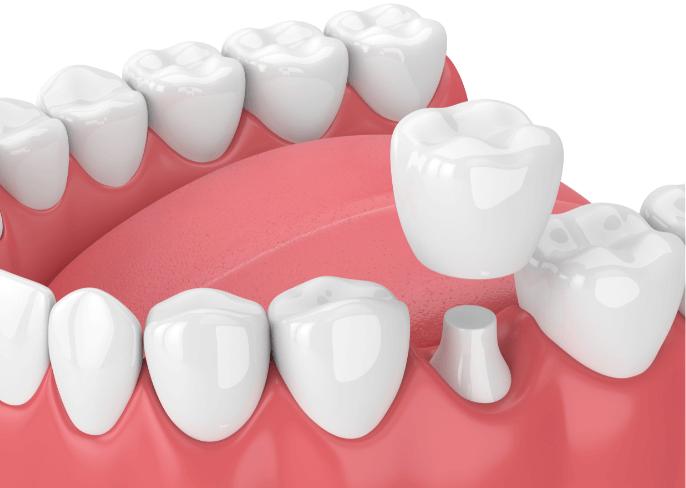Dental crowns act as caps that cover and protect teeth. They are used to address damaged, misshapen, misaligned, or discolored teeth, as well as hold dental bridges in place. Tooth crowns are also used to cover dental implants. Cracked or broken teeth can be supported by a crown, and teeth with large cavities or worn restorations benefit from dental crown treatment.
Made of sturdy porcelain ceramic material, dental crowns strengthen weak teeth and blend in with natural teeth. They are also custom-fitted to each patient. At Orchard Hill Dental, dentist in Hendersonville, NC Dr. Jessica Christy and her dental team provide dental crowns to patients because they protect teeth and offer a more stable bite. Tooth crowns are a restorative dentistry treatment Dr. Christy offers new and existing patients in Hendersonville.
Getting Dental Crowns in Hendersonville, NC
Getting a dental crown involves a few different steps and visits to our office. We’ll start with a consultation to ensure that a dental crown is the best choice for your needs. This includes a thorough oral examination and diagnostic testing, as well as discussing your budget, current oral health problems, and future goals.
If a crown is the best chocie for you, we start by preparing the tooth. We remove a portion of the tooth’s structure to make room for the crown, as it completely covers all sides of your tooth. When we complete tooth preparation, we take impressions of the tooth. The lab receives these impressions so that they can craft the crown to your specific measurements. We often fit you with a temporary restoration while the lab crafts the permanent crown.
Once it’s ready, you’ll come back into our office. We’ll fit the crown and ensure that it fits properly, to avoid any complications. When we’re satisfied with the fit, we permanently bond the crown to your tooth.

The Uses of Dental Crowns
Dental crowns are a popular tool that dentists utilize. This is because they can treat such a wide variety of cosmetic and restorative dental concerns.
Cosmetic Fixes
Discolored teeth are one of the most common concerns patients have. Typically, we use professional teeth whitening as the solution. But some discoloration doesn’t respond to traditional methods. Deeper staining, like those caused by medication, and discoloration caused by trauma are two examples. We color-match a dental crown to the shade of white you desire. It completely covers the tooth so no discoloration is visible.
Misshapen or disfigured teeth have both cosmetic and restorative implications. Many patients come in because they notice the cosmetic problems, but may or may not realize there are functional ones too. Depending on where the tooth is located in your mouth, it can cause issues with how you speak or eat. The interaction between tongue and teeth is how sounds and speech develop, while you may not be able to break down certain foods with misshapen teeth in certain areas.
Stabilizing Natural Teeth
One of the main uses for dental crowns is to reinforce natural tooth structure after a root canal procedure. During a root canal, we remove the infected dental pulp from the tooth’s interior. We sterilize the tooth and replace the pulp with a biocompatible material, sealing it from further infection. However, you don’t always get back the full function of your tooth. A dental crown ensures this, as well as further sealing off the tooth from infection in the future.
A traditional dental bridge uses a natural tooth on each side of the bridgespan as anchor teeth. Supporting a bridge puts a lot of extensive stress on the anchor teeth. They’re more likely to prematurely wear down, develop tooth decay, and succumb to other dental problems. We can use a dental crown to reinforce those natural anchor teeth. Instead of natural tooth structure taking on that pressure, the crown takes on the bulk of it.
Treating Severe Decay and Damage
Crowns are the last resort for teeth that have severe decay or damage. We practice conservative dentistry and use all of our best efforts to save the natural tooth structure. Crowns are the only solution that can fill in the areas of the tooth removed by decay. A crown also holds together all of the pieces of the tooth if it’s shattered or broken. When you keep the tooth root, you don’t experience the negative consequences of missing teeth.
If a piece of your tooth breaks off, a dental crown fills in the empty space that has broken off. Usually, this exposes dental nerves that cause pain when they brush against tissue or when you’re eating. You can also harm your gum and tongue tissue with the sharp edges of your tooth. A dental crown eliminates these possibilities.
Completing a Dental Implant
Dental crowns are often the most popular choice to complete a dental implant restoration. Implants both look and feel the most like missing teeth, especially with a dental crown completing them. Crowns are custom-made to blend into your smile perfectly. We match the shape, size, and shade of your teeth, so that no one can tell it’s a restoration.
Dental Crown FAQs
Dental crowns are often the best way to maintain natural tooth structure. Learn more by reading the answers to these frequently asked questions.
How many appointments will it take to get a dental crown?
The dental crown process typically takes 2-3 trips to our office. You will need one appointment to prepare your affected tooth for the dental crown and to take impressions. First, we will give you a temporary replacement tooth composed of resin. Afterward, we will send off your dental impressions to our ceramists so that they can craft your permanent dental crown. After 2-3 weeks, your crown will be ready, and we will attach the dental crown.
How do I care for my dental crown?
Once the dentist cements the dental crowns to your tooth, they will not require additional care. Maintaining a good oral hygiene routine will help increase the longevity of your dental crown. Additionally, you should see your dentist once every six months for standard preventative care. You should brush and floss your dental crown just like your natural tooth.
How long will my dental crown last?
With good oral hygiene habits, your dental crown can last many years. Typically, dental crowns last 15 years; however, they can last over 25 years, depending on your dental health. By scheduling regular preventative maintenance appointments with your dentist, you should be able to get many years of wearing out of your dental crown.
Will the dental crown procedure hurt?
The dental crown procedure can cause some discomfort. However, our team will take every preventative measure to ensure you do not feel any pain. Our sedation dentistry options are available to keep you calm and comfortable throughout the process.
Can a dental crown fall off or become loose?
Yes, a dental crown can become loose or fall off. However, it is rare. Tooth crowns fall out due to decay, injury, wear and tear, or poor fit. If you notice that your tooth crown is loose or has fallen off, it’s essential to contact your dentist. Leaving a loose or lost tooth crown untreated can lead to further complications. Your dentist will determine the appropriate course of action, which may involve re-cementing the tooth crown or fabricating a new one.
Can I eat normally with a dental crown?
Yes, you can eat normally with a dental crown. However, during the first few days after getting a tooth crown, you may want to avoid hard, crunchy, or sticky foods to give the cement time to set and ensure the crown is fully secure. After this initial period, maintaining good oral hygiene and attending regular dental check-ups will help keep your dental crown in good condition for many years.
Request an Appointment
Do you need a dental crown to support a cracked or broken tooth? Call our Hendersonville, North Carolina, dental office today at (828) 247-7001 or schedule a consultation online. Dr. Christy and her dental team are passionate about providing treatment options that support healthier smiles.
